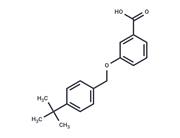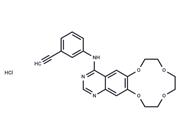| Name | Icotinib |
| Description | Icotinib (Conmana) is an orally available quinazoline-based inhibitor of epidermal growth factor receptor (EGFR), with potential antineoplastic activity. |
| Cell Research | Cells (103 /well) are seeded into 96-well plates in RPMI-1640 medium containing 10% FBS and grown in a 5% CO2 incubator at 37 °C. After 24 h, cells are treated with Icotinib at 0, 0.78, 1.56, 3.125, 6.25, 12.5 or 25 μM for 96 h. Cell proliferation is calculated by subtracting the mean absorbance value on day 0 from the mean absorbance value on day 4.(Only for Reference) |
| Kinase Assay | Biochemical kinase assays: In the in vitro kinase assays, 2.4 ng/μL EGFR protein is mixed with 32 ng/μL Crk in 25 μL kinase reaction buffer containing 1 μM cold ATP and 1 μCi 32P-γ-ATP. The mix is incubated with Icotinib at 0, 0.5, 2.5, 12.5 or 62.5 nM on ice for 10 min followed by incubation at 30 °C for 20 min. After quenching with SDS sample buffer at 100 °C for 4 min, the protein mix is resolved by electrophoresis in a 10% SDS-PAGE gel. The dried gel is then exposed to the PhosphorImager to detect radioactivity. Quantification is performed by ImageQuant software. In this methodology the radioactive signal inversely correlates with kinase activity. |
| In vitro | Icotinib inhibits EGFR activity in a dose-dependent manner, with an IC50 value of 5 nM and complete inhibition at 62.5 nM. Icotinib selectively solely inhibits the EGFR members including the wild type and mutants with inhibition efficacies of 61-99%. Icotinib blocks EGFR-mediated intracellular tyrosine phosphorylation in human epidermoid carcinoma A431 cells in a dose-dependent manner. Meanwhile, in our proliferation assay performed on A431, BGC-823, A549, H460, HCT8, KB and Bel-7402 cell lines, we found that the relative sensitivity of cell lines to Icotinib is A431 > BGC-823 > A549 > H460 > KB > HCT8 and Bel-7402. Icotinib exhibits a broad spectrum of antitumor activity and it is especially effective against tumors expressing higher levels of EGFR. [1] |
| In vivo | Icotinib shows an antitumor effect in different types of xenografts. Icotinib inhibits tumor growth at a rate of 51.5%, 31.0% and 67.4% in the A431, A549 and H460 xenografts at a dose of 120 mg/kg, respectively. [1] |
| Storage | Powder: -20°C for 3 years | In solvent: -80°C for 1 year | Shipping with blue ice. |
| Solubility Information | DMSO : 72 mg/mL (183.95 mM), Sonication is recommended.
Ethanol : 6 mg/mL (15.33 mM), Sonication is recommended.
H2O : < 1 mg/mL (insoluble or slightly soluble)
|
| Keywords | Icotinib | EGFR | BPI2009 | BPI 2009 |
| Inhibitors Related | Osimertinib | Lidocaine Hydrochloride hydrate | Lapatinib | Afatinib Dimaleate | Erlotinib hydrochloride | Erlotinib | Neratinib | Chalcone | Osimertinib mesylate | Genistein | Khellin | Gefitinib |
| Related Compound Libraries | Failed Clinical Trials Compound Library | Bioactive Compound Library | Kinase Inhibitor Library | Tyrosine Kinase Inhibitor Library | Anti-Cancer Clinical Compound Library | Drug Repurposing Compound Library | Inhibitor Library | FDA-Approved Kinase Inhibitor Library | Immunology/Inflammation Compound Library | Bioactive Compounds Library Max | Anti-Cancer Active Compound Library | Anti-Cancer Drug Library |

 United States
United States



